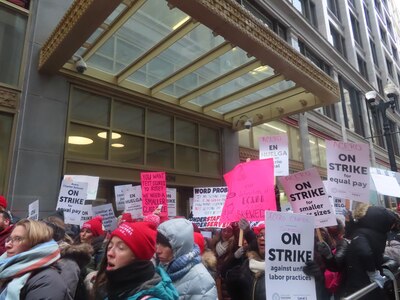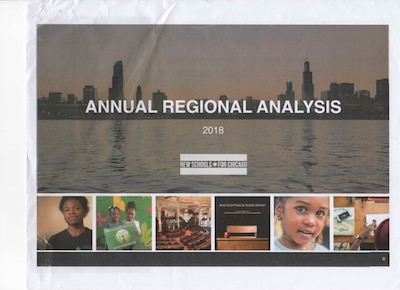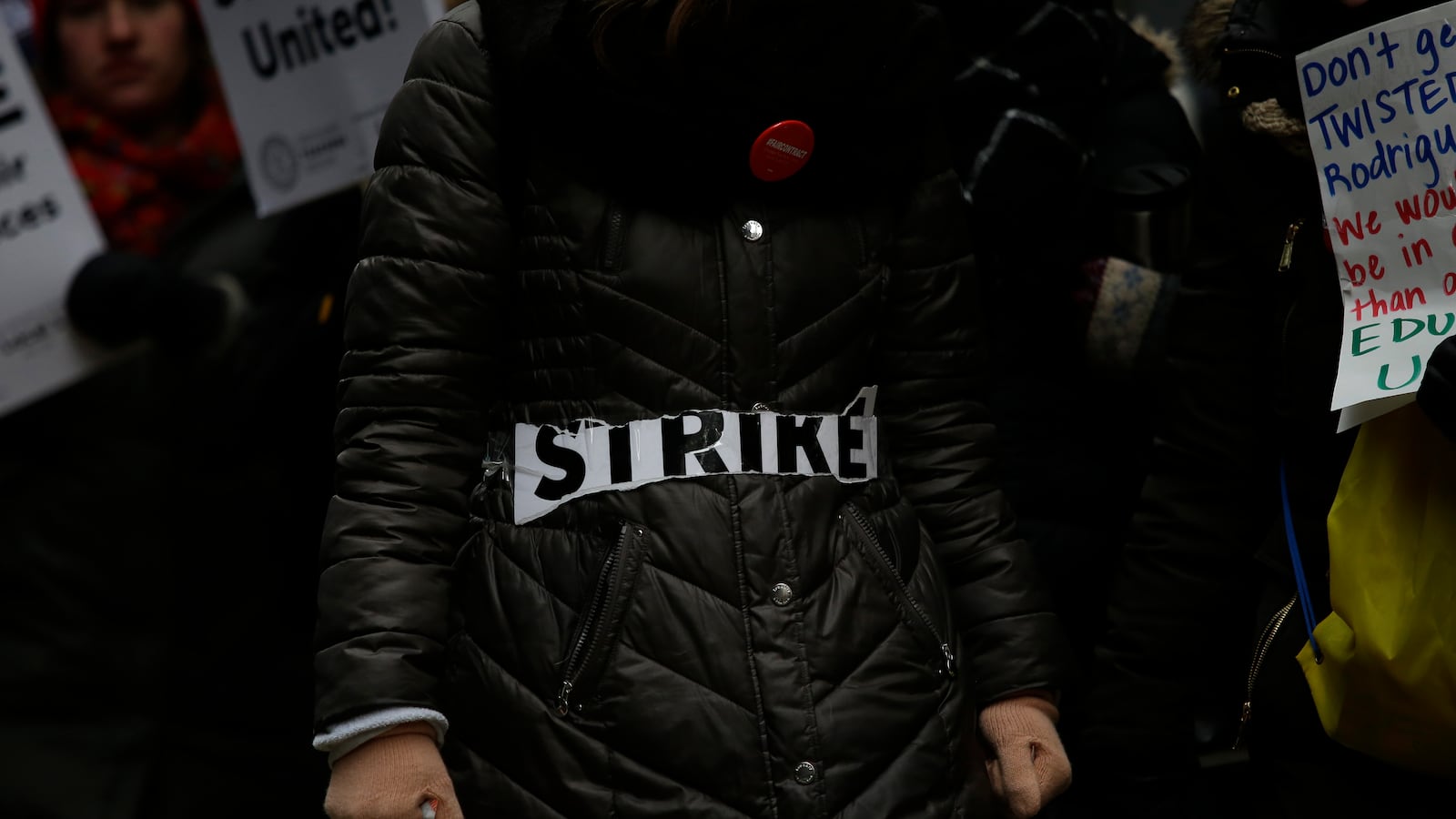Since Chalkbeat Chicago launched in June, we have published 200 stories about public education in the city. We’ve profiled programs, policies, and people, from a detailed analysis of the increasingly popular International Baccalaureate curriculum to the very personal story of a 16-year-old boy struggling to read. Looking back on it all, these are the 14 storylines that stood out this year — stories that we’ll be watching in 2019.
1. Chicago schools continued to show signs of improvement.
Graduation rates at Chicago schools continued to rise this past school year, reaching what district officials described as a record high, and more students from the district than ever before enrolled in college. Meanwhile, math scores trended up slightly on a national test called the NWEA that city students take each year, evidence that the district’s efforts to boost math skills are paying off, while reading scores were flat year over year.
Still, on each of these metrics, stubborn gaps by race persisted, with black and Latino students falling behind their white and Asian peers. CEO Janice Jackson has said that addressing these disparities is one of the top priorities for the district’s new chief equity officer, a first-of-its-kind position.
2. Enrollment continued to fall.
For the 16th straight year, enrollment in Chicago’s public schools fell, this time by about 10,000 students, according to a count taken on the 20th day of school. Size matters, because the number of students determines how many critical state dollars a district receives. At the school level, per-student funding determines how many teachers a principal can hire, whether or not there are librarians and arts teachers, and how many programs are offered.
3. There was stability in the CEO’s office, but leadership changes reverberated through City Hall and Springfield.
After a revolving door of school superintendents across the past decade, homegrown schools chief Janice Jackson officially assumed the CEO job in January, achieving what she described as a longtime professional dream.
Under her watch, the district unveiled a surprise $1 billion capital plan to fund long-awaited facility upgrades, technology, and new schools in Belmont-Cragin and on the Near West Side.
But beyond the schools chief office were some landscape-shifting leadership changes, chiefly Mayor Rahm Emanuel’s decision to not seek reelection — a decision that will decidedly impact schools. There was also the victory of billionaire businessman J.B. Pritzker in the Illinois gubernatorial election. Here’s how candidate Pritzker described his education agenda in an October interview with Chalkbeat Chicago and WBEZ.

4. The powerful teachers union experienced a big loss, followed by a big win.
In June, the Supreme Court ruled in Janus v. AFSCME that labor unions could no longer collect fees from employees on whose behalf they negotiate, but who haven’t joined the union as full members. It was a blow to groups like the Chicago Teachers Union, and many are still struggling to gauge the impact on their membership, finances, and, ultimately, their political muscle.
But earlier this month, an opportunity cropped up: The nation’s first-ever strike of charter teachers, when some 500 unionized teachers at Acero charter schools in Chicago walked off the job, reverberated across the country. It grabbed the attention of the broader education community that may have regarded charters as on the fringes of their interests — until now.
5. Attempts to reform the special education system got off to a shaky start.
In spring, the state took over the district’s special education program after an investigation revealed systemic delays and denials of services for scores of students with disabilities. By the fall, special education advocates were complaining that the state’s efforts were slow and understaffed.
They also charged that the independent monitor overseeing reforms, Laura Boedeker, and her superiors at the Illinois State Board of Education had failed to communicate with parents and roll out a process for repairing harm to students. In a November interview with Chalkbeat, Boedeker had this to say.
6. Chicago schools faced a second gauntlet of ratings.
Ratings are intended to signal school quality. But what happens when multiple ratings measure multiple things and don’t always paint the same picture of school performance? In October, the state education board released its annual report cards for schools across the state — and this year, for the first time, each school received one of four quality stamps. Nearly half of Chicago schools failed to meet the state’s threshold for performance.
7. It was a cold freeze in the world of charters.
It was a tough year for the independently operated public schools: the state’s newly elected governor, J.B. Pritzker, said while campaigning that he supported a moratorium on new charters. Meanwhile, state legislators worked to repeal the authority of the state charter commission, and Chicago Public Schools denied all new charter applications for the next school year.
8. A sexual abuse crisis rocked Chicago schools.
The district’s widespread failure to protect student victims was first reported in early June in the Chicago Tribune. In response, Jackson and district leadership announced several policy changes, including redoing background checks on teachers, vendors, coaches, and volunteers. That led to staffing shortages at the start of school and raised concerns from school council members and parent volunteers. Meanwhile, a preliminary report found that instability in leadership at Chicago schools contributed to a gap in oversight.
9. A measure of preschool performance debuted.
A new set of metrics released by the Illinois State Board of Education in conjunction with a power list of early childhood advocates showed that three out of four Illinois children starting kindergarten aren’t prepared. The data highlighted a critical need for better preparation in preschool and child care across the state.
10. The early education community wrestled with some tough questions.
A critical shortage of qualified staffers to work in infant centers, daycare programs, and community-based preschools threatened to undercut any push for universal pre-K program, which governor-elect J.B. Pritzker has repeatedly said he’d pursue.
Meanwhile, advocates throughout the state continued to sound the alarm over a decline in the number of children in state child care programs — as well as a dwindling number of providers. Then there’s this sobering statistic: In Illinois, the average annual cost of child care now outpaces what families spend on a year of rent.

11. A controversial school inventory report signaled a change in the way the district does business.
In September, the school district released a comprehensive report confirming what many Chicagoans already know: Supply and demand for schools is uneven across neighborhoods, top academic schools are clustered in wealthier parts of the city, fewer black and Latino students have access to those schools, and more students are forgoing their neighborhood school.
The district’s release of the Annual Regional Analysis came a month after Chalkbeat obtained a copy of the then-unreleased report, which was compiled with help from the school-choice group Kids First Chicago. The report spurred town hall-style meetings intended to engage parents and community leaders and was cited as reasoning in the school board’s denial of a proposed downtown charter high school.
12. Chicago backed down from a school closing.
Parents seeking to stop Chicago Public Schools from displacing the popular National Teachers Academy in the Near South Side won a victory in what attorneys say may be the first court-ordered freeze of a school-closing measure in Chicago. The plan to close a beloved elementary school and open a new high school had pitted neighbors against each other and fueled calls of racism in the school closing decisions.
13. The founder of Chicago’s largest charter network stepped down, ending an era.
Longtime Noble Network founder and CEO Michael Milkie announced that he would retire, after revelations of a pattern of “inappropriate behavior with alumni,” which included hand-holding and “an instance of slow-dancing.” The announcement provided fodder for teachers who have been struggling to unionize Chicago’s biggest charter network. They said the developments strengthened their case for why the network needs a union.
14. Students spoke out about what they want in their schools.
From this video of a Chicago high schooler demanding more diversity in her English reading curriculum to a sit-in staged by students at Martin Luther King Jr. College Prep that included a list of concrete demands, students had a lot to say this year about what adults can do to help improve public education. They even have a message for the next occupant of City Hall. In this Chalkbeat Chicago video, Chicago high schoolers tell the city’s next mayor their ideas for improving public schools.

